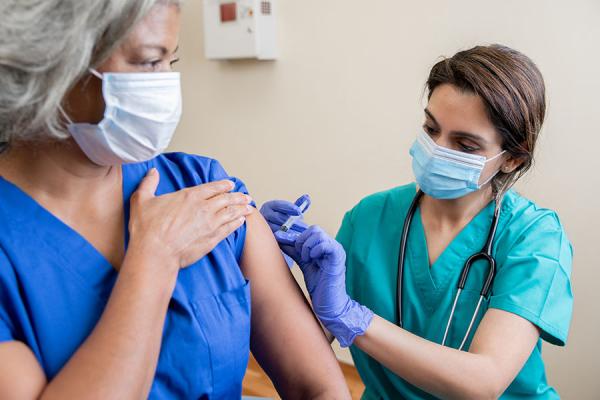Just 20% of Ky. adults say a health-care provider has contacted them about a Covid-19 shot; only 14% say their health insurer has

By Al Cross and Melissa Patrick
Kentucky Health News
Only one in five Kentuckians say they have been contacted by a health professional about getting a Covid-19 vaccine, and just one in seven say have been contacted for that reason by their health-insurance provider, according to a statewide poll taken Aug. 4 through Sept. 4.
Twenty percent of adults said a doctor, nurse or other health professional had contacted them about vaccination, and only 14% said their health-insurance provider had, the poll for the Foundation for a Healthy Kentucky discovered.
Foundation President and CEO Ben Chandler announced the poll results during the foundation’s annual Howard L. Bost Memorial Health Policy Forum. He said the results for health-care professionals were “a little bit surprising” and those for health-insurance providers were “a real shocker.”
“What this tells us, I think, is that we have a lot of work to do,” Chandler said. “Would doctors and health insurance providers reaching out have made a difference in where we are today? Well, I don’t know the answer to that. But I do think . . . it’s certainly worth a try in the future to think about seeing if we could figure out a way to get doctors and to get insurance companies to reach out more effectively and, and in a systematic way to the people who have not gotten vaccinated.”
The poll also found that Kentucky adults said they would take recommendations on vaccines from their health-care providers, but for reasons unknown the providers have not reached out to them much, Chandler said.
The poll asked Kentucky adults if they agreed with this statement: “Generally, I do what my doctor or health-care provider recommends about vaccines for me.” Sixty percent strongly agreed, 22% agreed somewhat, 1% leaned toward agreeing, 9% disagreed somewhat, 6% strongly disagreed and 2% said they didn’t know. The older and better educated the respondent, the more likely they were to agree.
The poll, which had an error margin of plus or minus 4.3 percentage points, found that 27% of adults who had not taken a Covid-19 vaccine said they strongly agreed that they would take their vaccine recommendations from their doctor. Chandler said that suggests that one-third of Kentuckians might be persuaded by their doctor or other health-care provider to get a Covid-19 shot. Just over half have received one dose of a vaccine so far.
“We may be able to figure out a way to create a system where this could happen,” Chandler said. “I think we could maybe make up some ground if we did that.”
Cory Meadows of the Kentucky Medical Association, the lobby for physicians, was asked during a forum panel discussion about vaccine messaging why more providers aren’t reaching out to their patients. He said it could be due partly to their a heavier-than-usual workload after pandemic slowdowns last year.
“I do think there’s a practical side to it,” Meadows said. “Given the workload and the patient load that they have . . . the real side of it right now is catching up on a lot of stuff. But I do think that many of them are starting to have those conversations, especially during this Delta surge.”
Dr. Brent Wright of Glasgow while moderating a panel on the first day of the forum said it’s difficult to have 15-minute conversations to explain vaccines and when you are running 30 minutes behind already.
Meadows acknowledged that some health-care providers may be reluctant to bring up the controversial topic of Covid-19 vaccination for fear of losing patients, but said that while they may be careful to soften their tone, he did not think that was a significant factor.
“There may be a certain element to that,” he said. “I think physicians try to be sensitive to patients’ concerns. However, I think given the severity of this virus, especially with the Delta surge, I don’t sense, at least in my conversations with physicians, that that’s holding a lot of them back. . . . I think given the severity of the situation, that barrier is not there, maybe it would be in normal times so as not to offend their patient.”
The poll found little statistical difference among various groups of Kentuckians, but the results suggested differences among educational levels. College graduates appeared least likely to say they had been contacted by a health professional, but appeared most likely to be contacted by their health insurer.
Conversely, those with a high-school diploma or less education seemed most likely to say they had been contacted by a health professional, and among the least likely to say they had been contacted by their health insurer.
More than a third of Kentuckians get free health care through Medicaid, a federal-state program for the low-income and disabled. State government uses insurance-company subsidiaries to manage relations with Medicaid beneficiaries, who have a low vaccination rate.
Any possibility that the beneficiaries may not think of managed-care firms as a “health-insurance provider,” the wording used in the poll question, did not arise when the poll was field-tested before it was conducted, pollster Eric Rademacher of the University of Cincinnati told Kentucky Health News.
The Kentucky Association of Health Plans, the lobby for insurance companies in the state, said it had engaged in “unprecedented outreach campaigns” with community partners, using “calls, texts, emails, letters, social media, events, giveaways, and promotions to encourage commercial and Medicaid plan members to receive the Covid-19 vaccine.”